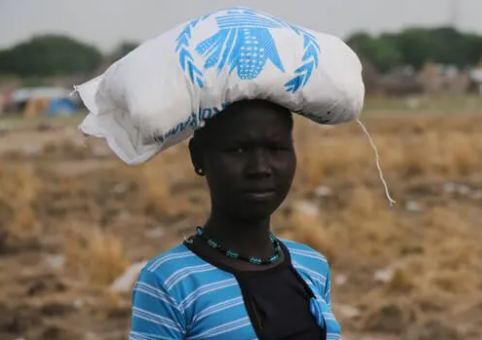The United Nations World Food Programme (WFP) has welcomed a contribution of USD 1.29 million (€1.2 million) from France to provide nutrition assistance to thousands of people in South Sudan, the UN agency said in a Tuesday press statement.
According to WFP, more than 7.74 million people in South Sudan are increasingly hungry after years of conflict, the impact of climate shocks such as flooding, and economic crises.
“WFP will use this contribution to provide specialized nutrition assistance for the treatment and prevention of malnutrition in 24,222 children between the age of 6-23 months, as well as pregnant women and breastfeeding mothers. Additionally, 25,000 people, mainly women, will receive training and awareness-raising sessions in nutrition best practices,” the statement said.
According to the French Embassy in South Sudan, while new hotspots with rising humanitarian needs and deteriorating food security have recently emerged globally, France wishes to reaffirm its support to the people of South Sudan who are facing a catastrophic situation.
“After having provided the WFP with funding of 1.15 million euros (USD $1.24 million) in 2021, France is glad to participate again this year in the WFP’s nutrition assistance operations, essential to the survival of the South Sudanese population,” said Marc Trouyet, Ambassador of France to the Republic of South Sudan.
The latest Integrated Food Security Phase Classification (IPC) report shows that the number of food-insecure people has increased in South Sudan from 7.2 million in 2021 to 7.74 million in 2022. It is also estimated that around 1.34 million children under five will suffer from acute malnutrition, with the most affected states being Jonglei, Upper Nile, Unity, and Western Bahr el Ghazal.
Adeyinka Badejo, Acting Country Director of WFP in South Sudan, said the timing of the contribution from France is critical.
“South Sudan is facing an unprecedented humanitarian crisis, and we have seen a sharp rise in the number of malnourished children in some areas this year,” Badejo said. “The look of despair in the faces of the children impacted is unsettling. This remains a key priority for WFP in South Sudan and France’s contribution will play a crucial role in the treatment and prevention of malnutrition for some of the most vulnerable women and children.”
In mid-June, WFP said it was going to suspend distributing food aid to almost one-third of the acutely food insecure population in South Sudan that the agency planned to support this year due to critical funding shortages, heightening the risk of starvation for 1.7 million people.




